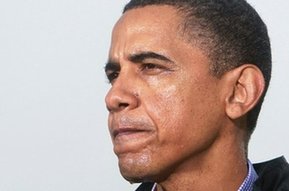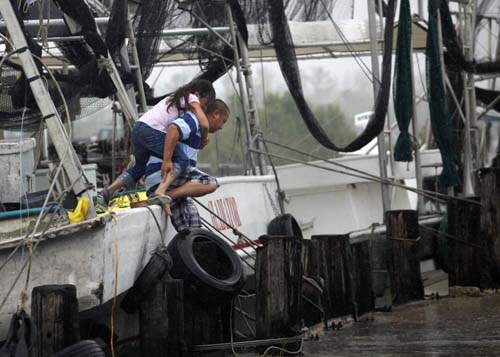Asia-Pacific
Obama seeks to reassure as oil slick nears coast
(Agencies)
Updated: 2010-05-03 16:36
 |
Large Medium Small |
WASHINGTON – President Barack Obama is trying to reassure fishermen and others on the Gulf Coast that the government is doing all it can as masses of oil from a pipeline rupture endanger fisheries, oyster beds and beaches.
|
 Standing in the rain, President Barack Obama makes a statement to reporters at the Coast Guard Venice Station in Venice, La., as he visits the Gulf Coast region affected by the BP (British Petroleum) oil well spill, Sunday, May 2, 2010. [Agencies] |
Obama took a brief helicopter tour 15 miles east of Venice to view the kinds of marshlands and estuaries threatened by the spill. High winds prevented him from flying over the 30-mile spill itself.
The leaking oil imperils not only the environment but an abundant fishing industry, which Obama called "the heartbeat of the region's economic life." In front of a cabin and RV park in Boothville, along Louisiana Highway 23, was a plywood sign pleading, "Obama Send Help!!!!"
"We're going to do everything in our power to protect our natural resources, compensate those who have been harmed, rebuild what has been damaged and help this region persevere like it has done so many times before," Obama said.
It appeared little could be done in the short term to stem the oil flow, which was also drifting toward the beaches of neighboring Mississippi and farther east along the Florida Panhandle. Obama said the slick was 9 miles off the southeastern Louisiana coast.
Another potential hazard was a political one that depends on how the public judges the Obama administration's response. In 2005, President George W. Bush stumbled in dealing with Hurricane Katrina in the Gulf and left the impression of a president distant from immense suffering. His presidency never recovered.
Administration officials said they were on top of the accident from the first day. A declaration of national significance — opening the way for greater government involvement — came nine days later, when a new leak was discovered and it was determined that far more oil was leaking from the site than initially estimated.
|
 Chuc Nguyen and his daughter Isabel leave one of the shrimp boats belonging to their family business in Venice, Louisiana May 2, 2010. US officials closed commercial and recreational fishing for a minimum of 10 days in federal waters affected by the massive oil spill in the US Gulf of Mexico, the National Oceanic and Atmospheric Administration said on Sunday. [Agencies] |
An investigation is under way into the cause of the April 20 well explosion and, depending on its outcome, questions may be raised about whether federal regulation of offshore rigs operating in extremely deep waters is sufficient and whether the government is requiring the best available technology to shut off such wells in event of a blowout.
Administration officials have been at pains to explain that Obama's late March decision to expand offshore oil exploration could be altered as a result of the spill and that stricter safety rules would doubtless be written into leases.
In reality, oil companies and the government lack the technology to prevent the damage from a well gushing oil, killing wildlife and tainting a delicate ecosystem.
Adm. Thad Allen, the Coast Guard commandant, said the volume of spewing oil could climb to 100,000 barrels a day in the event of a total wellhead failure, a much greater breach than is believed to exist now.











